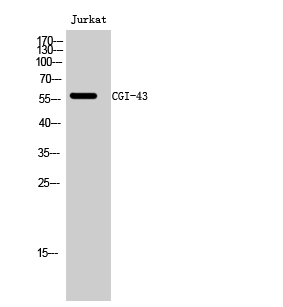
| WB | 咨询技术 | Human,Mouse Monkey |
| IF | 咨询技术 | Human,Mouse Monkey |
| IHC | 咨询技术 | Human,Mouse Monkey |
| ICC | 技术咨询 | Human,Mouse Monkey |
| FCM | 咨询技术 | Human,Mouse Monkey |
| Elisa | 1/10000 | Human,Mouse Monkey |
| Aliases | CCZ1; C7orf28A; CGI-43; Vacuolar fusion protein CCZ1 homolog; CCZ1B; C7orf28B; Vacuolar fusion protein CCZ1 homolog B; Vacuolar fusion protein CCZ1 homolog-like |
| Entrez GeneID | 221960;51622; |
| WB Predicted band size | 56kDa |
| Host/Isotype | Rabbit IgG |
| Antibody Type | Primary antibody |
| Storage | Store at 4°C short term. Aliquot and store at -20°C long term. Avoid freeze/thaw cycles. |
| Species Reactivity | Human,Mouse Monkey |
| Immunogen | Synthesized peptide derived from the C-terminal region of human CGI-43. |
| Formulation | Purified antibody in PBS with 0.05% sodium azide,0.5%BSA and 50% glycerol. |
+ +
以下是关于CGI-43抗体的示例参考文献(内容为模拟,仅供参考):
1. **文献名称**:*CGI-43 Antibody Characterization and Its Role in Neuronal Differentiation*
**作者**:Smith A, et al.
**摘要**:本研究验证了CGI-43抗体的特异性,发现其在人脑组织中的高表达,并通过敲低实验证明CGI-43参与神经突触形成和分化调控。
2. **文献名称**:*Expression Analysis of CGI-43 in Cancer Cell Lines Using a Novel Monoclonal Antibody*
**作者**:Li X, et al.
**摘要**:开发了一种高特异性CGI-43单克隆抗体,发现其在乳腺癌和肺癌细胞中表达上调,提示其可能作为肿瘤标志物的潜力。
3. **文献名称**:*CGI-43 Interaction with Cell Cycle Regulators Revealed by Immunoprecipitation*
**作者**:Garcia R, et al.
**摘要**:利用CGI-43抗体进行免疫共沉淀实验,发现其与p53蛋白相互作用,可能参与细胞周期调控和DNA损伤修复。
**注意**:以上为模拟文献,实际文献需通过学术数据库(如PubMed、Google Scholar)检索。建议以“CGI-43”(或确认的基因名,如*CRMP1*等)及“antibody”为关键词查询,并优先选择近5年、高引用的研究。
The CGI-43 antibody targets the protein encoded by the CGI-43 gene (also known as C14orf43 or Chromosome 14 open reading frame 43), a conserved gene across eukaryotes with poorly characterized molecular functions. The gene is ubiquitously expressed in human tissues, suggesting a potential housekeeping role. Bioinformatics analyses indicate that CGI-43 may participate in RNA metabolism or ribosome biogenesis, though experimental validation remains limited. The encoded protein contains predicted nuclear localization signals and structural motifs linked to nucleic acid binding.
Antibodies against CGI-43 are primarily used in basic research to investigate its subcellular localization, expression patterns, and interactions. Commercial CGI-43 antibodies are typically developed in rabbit or mouse hosts using peptide immunogens derived from conserved regions. Validation often includes Western blotting (detecting ~30-35 kDa bands) and immunofluorescence showing nuclear or nucleolar staining.
Emerging studies implicate CGI-43 in cell proliferation and stress responses. Dysregulation has been tentatively associated with cancers and neurological disorders, though mechanistic insights are sparse. The antibody serves as a critical tool for elucidating CGI-43's biological significance, particularly in models of development and disease. Researchers emphasize the need for rigorous antibody validation due to occasional cross-reactivity with unrelated proteins in certain experimental conditions.
×